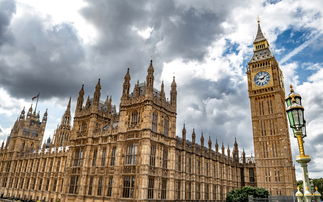Something weird is happening in global geopolitics: there is division everywhere, but on climate action Trump's efforts to sow discord keep being rebuffed - what's going on?
Who is winning? The narrative that now dominates G20 gatherings is only a few steps removed from the apocalyptic 'clash of civilisations' rhetoric that has done so much to fuel global instability over the past two decades. The dividing line this time is not so much between competing religions or globalism and nationalism, although both those eternal tensions are thrown into the feverish mix. No, the current battle of ideas and resources is between liberalism in all its forms and an illiberalism that morphs effortlessly into autocracy, kleptocracy, pollutocracy, and aggressive nationalism.
Any attempt by leaders of liberal democracies to downplay these dangerous currents are quickly torpedoed by the shameless stoking of said divisions by those autocrats who draw power at home from the idea of threats abroad.
Vladimir Putin was on top trolling form ahead of the latest G20 Summit in Osaka declaring liberalism in its entirety was a busted flush, an outdated and dying concept that had little to offer a modern world defined by national power plays. As if to prove his point, there was Saudi Arabia's Mohammad Bin Salman, front and centre in the group photograph of world leaders, reveling in the honour of hosting next year's G20 - all the credible allegations of the state's involvement in the murder and dismemberment of a Washington Post journalist apparently forgotten. And there too was President Trump, joking with Putin about silencing journalists, heaping praise on dictators, and letting his daughter gatecrash high level diplomatic meetings.
As Trump jetted from Osaka to personally drop off a diplomatic gift to the North Korean government, it was hard to escape the impression that liberalism is facing its biggest and most multi-faceted threat since the end of the Second World War - a threat that thanks to its insidious, hyper-connected, fake news-peddling nature arguably exceeds that presented by Soviet-style Communism. Who is winning? It looks like they are, but honestly who can tell.
And yet this weekend there was a surprising and potentially encouraging coda to the big picture battle between Putin, Trump, and co and Merkel, Macron, Trudeau, Tusk, and the rest of the seemingly battered western alliance. Because if the liberal v illiberal schism is deepening, why then is the near universal international backing for bolder climate action apparently standing firm in the face of President Trump's characteristically unsubtle attempts to undermine it?
The Osaka Summit kicked off with Japan apparently acceding to US demands to drop any mention of the Paris Agreement from the final text and dilute the references to climate change to homeopathic levels. Within 48 hours not only was the Paris Agreement back in, but a reference to its "irreversibility" was retained along with a recognition that bolder climate action plans are required. Support for phasing out fossil fuel subsidies was also reinstered for good measure. Moreover, China and France pledged to deliver more ambitious decarbonisation plans by next year, and the UK, Chile, France, Germany, the Netherlands and Spain all publicly reasserted their view that climate neutrality by 2050 has to be the default setting for industrialised economies.
The US was left to settle for a repeat of the last G20 Summit where an additional paragraph was inserted into the text to create the G19 + 1 - the one being the US and its standalone opposition to the Paris Agreement and auto-satirical insistence it is committed to taking impressive climate action outside of the accord.
What is happening here? Why is the Trump administration struggling to hive off support for its coal-boosting assault on the Paris Agreement? Putin has questioned the need for climate action, the Saudis and other petrostates remain deeply ambivalent towards the accord and have sought to undermine it, while Brazil's Bolsonaro has made no secret of his hostility towards environmentalism. Given Trump's apparently warm relations with autocratic strongmen it must be chalked up as a massive foreign policy failure for the White House that it has not put more of a dent in the coalition that delivered the Paris Agreement? This should be the ripest of territories for GOP-sponsored mischief, and yet so far not a single victory has been recorded.
There are three inter-related explanations for this geopolitical mystery.
The first is that while some governments may hint at their climate scepticism or question the effectiveness of the Paris Agreement, they can still see how support for the accord benefits them. They fear future climate impacts and the instability they could bring, they can see the rapid evolution of disruptive clean energy technologies, and they understand the Paris treaty centres on voluntary national action. As such, supporting the agreement becomes a low cost hedging strategy, allowing them to edge towards a cleaner growth model, start to mitigate against the risk of a rapid low carbon transition, and secure some credit from domestic and international audiences for doing so, while still pursuing fossil fuel development - Russia, Saudi Arabia, we are looking at you.
The second is that the debate over climate action does not and will never follow a liberal v illiberal dynamic. Climate impacts do not care which political system you employ. This reality could provide a source of encouragement or point the way to a very disturbing future.
On the plus side one of the reasons Trump has struggled to undermine the Paris Agreement consensus is that there is another superpower in town in the form of China and it won't let him. The growing sphere of influence enjoyed by China, and to a lesser extent the EU and India, means that a serious counterweight to Trump's hostility towards decarbonisation remains in place. Any country seriously considering reneging on its climate pledges can expect a phone call from Beijing and potentially trade barriers from the EU. Trump's hope that real politik could convince countries to ditch the Paris Agreement cuts both ways.
Less encouragingly, autocratic support for climate action does raise fears that Vox's David Roberts could prove prescient when he warned recently that escalating impacts could be used by the US right to justify a climate fascism/nationalism based on defence, border walls, and ever more rapid fossil fuel development. It is easy to see how other states with fewer democratic checks and balances could easily tread a similar path if rapid decarbonisation falters.
1. I'm gonna write a proper piece about this soon, but for now a quick thread on the direction of US conservative climate policy. I think over the next 10 years -- & probably much sooner -- we'll see two distinct trends.
— David Roberts (@drvox) June 25, 2019
Finally, and even more depressingly, the possibility remains that Trump's attempt to explode the Paris consensus will work, it is just taking a bit longer than planned. Putin, Bin Salman, et al could simply be biding their time and waiting to see if Trump secures a second term before launching their own high risk assaults on the agreement. Under this reading everything rests on next November's US presidential election and a straight choice between a party that backs the Paris Agreement and wants net zero emissions by 2050 and one led by the world's most notorious climate sceptic.
Why does this geopolitical bun-fight matter to businesses and investors? There is an argument that it is something of an irrelevance, and a distracting one at that. As the UN secretary-general's special representative Rachel Kyte observed the G20 feels "increasingly disconnected" from a world where climate impacts are becoming ever more severe.
We [the G20] are increasingly disconnected from the rest of the world … scientists remind us of our duty in matters of climate change...our youth every week remind us of our duty, while we at the G20 discuss whether we can still cite the Paris agreement. https://t.co/cn6rCURsP2
— Rachel Kyte (@rkyte365) June 30, 2019
It is a fair point, especially as global emissions keep rising. But there is a more upbeat interpretation that goes back to what the Paris Agreement was always about in the first place: investment signals.
The accord's primary value is in its informing of business leaders and investors that the fossil fuel age is on the way out and incumbent dirty technologies risk being stranded. It is a message to decision-makers the world over that governments would do their damndest to decarbonise - they wouldn't get everything right and there will be setbacks aplenty, but net zero is the direction of travel. Instill enough confidence, and investment should then flow on the back of that assumption.
As such, every time the G19 remains intact and tacitly condemns the White House for its recklessness it matters. Every time a country declares it will strengthen its climate goals and policies it matters. And every time a government rebuffs the temptation to play to the right wing gallery and ditch any pretence of climate action it matters.
Businesses and investors now have to ask themselves what is more likely: a Trump second term and a domino effect of petrostates rowing back on their Paris pledges, or the bulk of the world's largest markets - the EU, China, India, and others - doing as they have repeatedly said they will do and ratcheting up their decarbonisation efforts as clean tech costs plummet and public concern intensifies? When a Democrat next returns to the White House, which could be very soon, which side of this debate are they likely to land on?
Who is winning? It is less than clear cut, but the world's top businesses increasingly understand that the strongest investment signals are coming from the continued strength of the Paris Agreement and the net zero transition it has sparked.
A version of this article originally appeared in the BusinessGreen Overnight Briefing email, which is available to all BusinessGreen subscribers.









